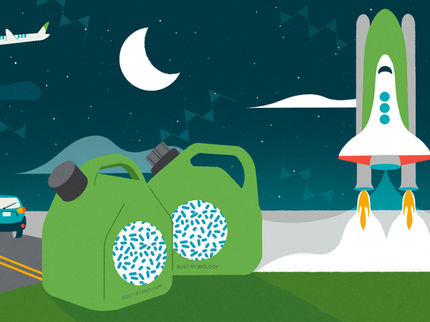Fueling aviation with hardwoods
A multi-university study highlights an alternative biofuel which may be utizlized by the transportation industry
A key challenge in the biofuels landscape is to get more advanced biofuels—fuels other than corn ethanol and vegetable oil-based biodiesel—into the transportation pool. Utilization of advanced biofuels is stipulated by the Energy Independence and Security Act; however, current production levels lag behind proposed targets. Additionally, certain transportation sectors, such as aviation, are likely to continue to require liquid hydrocarbon fuels in the long term even as light duty transportation shifts to alternative power sources. A multi-university team lead by George Huber, Professor of Chemical and Biological Engineering at the University of Wisconsin-Madison, has addressed both challenges through the concerted development of technology designed to transform lignocellulosic biomass into a jet fuel surrogate via catalytic chemistry. This promising approach highlights the versatility of lignocellulose as a feedstock and was recently summarized in the journal Energy & Environmental Science by team member and lead author Jesse Q. Bond, Syracuse University Assistant Professor of Biomedical and Chemical Engineering.
Lignocellulosic biomass is an abundant natural resource that includes inedible portions of food crops as well as grasses, trees, and other "woody" biomass. According to the United States Department of Energy, the United States could sustainably produce as much as 1.6 billion tons of lignocellulose per year as an industrial feedstock. Lignocellulose can be processed to yield various transportation fuels and commodity chemicals; however, current strategies are not generally cost-competitive with petroleum. Here, Huber's team presents a comprehensive approach toward streamlining biomass processing for the production of aviation fuels. The proposed technology hinges on efficient production of furfural and levulinic acid from sugars that are commonly present in lignocellulosic biomass. These two compounds are then transformed into a mixture of chemicals that are indistinguishable from the primary components of petroleum-derived aviation fuels.
The technology was demonstrated through a multi-university partnership that brought together expertise in biomass processing, catalyst design, reaction engineering, and process modelling. Economic analysis suggests that, based on the current state of the technology, jet fuel-range hydrocarbons could be produced at a minimum selling price of $4.75 per gallon. The work also identifies primary cost drivers and suggests that increasing efficiency in wastewater treatment and decreasing catalyst costs could reduce that amount to $2.88 per gallon.
"This effort exemplifies the impact of a well-designed collaboration," said Bond. "As individual researchers, we sometimes focus too narrowly on problems that we can resolve using our own existing skills. Biomass refining is complex, and bio-based aviation fuels are difficult targets. Many of the real roadblocks occur at scarcely-studied research intersections. In our view, the only meaningful way to tackle these challenges is through strategic partnerships, and that is precisely what we've done in this program."
Topics
Organizations
Other news from the department science
These products might interest you

BRC - Berghof Reactor Controller by Berghof
BRC - complete package for data acquisition, storage and control of all process parameters
Touch controllers are easy to use and provide quick access to all important functions

Berghof Reaktortechnologie - Hoch- und Niederdruckreaktoren, Druckbehälter und metallfreie Reaktoren by Berghof
Safe high- and low-pressure systems for aggressive media
Corrosion-resistant reactors with PTFE lining - individually configurable

Get the chemical industry in your inbox
By submitting this form you agree that LUMITOS AG will send you the newsletter(s) selected above by email. Your data will not be passed on to third parties. Your data will be stored and processed in accordance with our data protection regulations. LUMITOS may contact you by email for the purpose of advertising or market and opinion surveys. You can revoke your consent at any time without giving reasons to LUMITOS AG, Ernst-Augustin-Str. 2, 12489 Berlin, Germany or by e-mail at revoke@lumitos.com with effect for the future. In addition, each email contains a link to unsubscribe from the corresponding newsletter.



























































